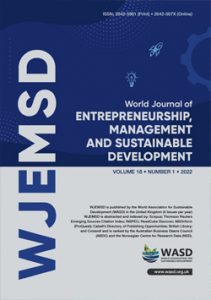Perceived organizational justice and work-related attitudes: a study of Saudi employees, Dr. Abdallah Elamin
Dr. Abdallah M. Elamin
Department of Management and Marketing, College of Industrial Management
King Fahd University of Petroleum and Minerals, Dhahran
Saudi Arabia
Email: magzoob2@yahoo.com
DOI: 10.1108/20425961211221633
Purpose: The purpose of this paper is two‐fold: first, to examine the influence of perceived organizational justice on Saudis’ work‐related attitudes, namely, job satisfaction and organizational commitment. Second, to examine the differential effects of distributive and procedural justice on the above‐mentioned work‐related attitudes.
Design/methodology/approach: Using a self‐administered questionnaire, 600 Saudi employees from 24 organizations operating in an Eastern province in Saudi Arabia were surveyed. Correlation and hierarchical regression analyses were used to examine the hypotheses of the study.
Findings: The paper revealed that justice plays a significant role in influencing Saudi employees’ level of job satisfaction and commitment. An examination of the differential affects of justice revealed that distributive justice tends to be a stronger predictor of job satisfaction compared to procedural justice. Moreover, despite the significant positive correlation between procedural justice and organizational commitment, there was no influence of procedural justice on organizational commitment when the influence of inter‐actional justice and distributive justice had been controlled.
Practical implications: The theoretical and practical implications of the results are discussed in the paper. Recommendations are provided to managers in Saudi organizations to enhance perceptions of justice in the workplace.
Originality/value: The paper contributes to the knowledge of the topic of organizational justice in Saudi Arabia, which is under‐studied in academia. The paper not only advances the literature pertaining to organizational justice theories by empirically demonstrating the importance of organizational justice for developing positive work outcomes in a non‐Western developing context, but also elucidates the differential effects of distributive and procedural justice on work‐related attitudes.
Keywords: Saudi Arabia; Employees behaviour; Job satisfaction; Justice; Work‐related attitudes; Saudi employees; Organizational culture.
Citation: Elamin, A.M. (2012), "Perceived organizational justice and work‐related attitudes: a study of Saudi employees", World Journal of Entrepreneurship, Management and Sustainable Development, Vol. 8 No. 1, pp. 71-88. https://doi.org/10.1108/20425961211221633

